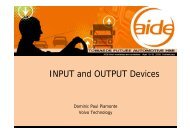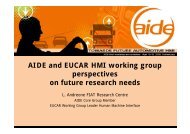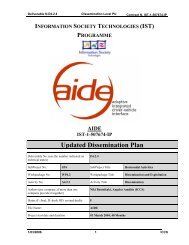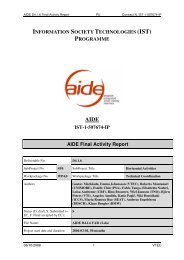download deliverable - AIDE
download deliverable - AIDE
download deliverable - AIDE
You also want an ePaper? Increase the reach of your titles
YUMPU automatically turns print PDFs into web optimized ePapers that Google loves.
Deliverable D4.2.1 Dissemination Level PU Contract N. IST-1-507674-IP<br />
3.2. Design scenarios and HMI meta-functions - Towards an Adaptive Integrated HMI<br />
Presenter: Dipl.-Ing. H. Kussmann, Robert Bosch GmbH.<br />
Today, more and more IVIS (in-vehicle information systems) and ADAS (adaptive driver<br />
assistance systems) applications are integrated in vehicles which individually interact with the<br />
driver and sometimes even dedicated I/O devices are used.<br />
The main objective of <strong>AIDE</strong> is to improve the driver system interaction in terms of<br />
preventing interference between different I/O events coming at the same time and in terms of<br />
adapting the HMI depending on the driver state, driving situation and driver preferences. The<br />
I/O management and system adaptation should reduce driver distraction and improve driving<br />
safety.<br />
In addition to that, a fully integrated in-vehicle HMI allows the exploitation of synergies<br />
and thus, reduces HW costs and enhances system performance. Last but not least in the <strong>AIDE</strong><br />
project also the safe integration of nomad devices is part of the integrated HMI.<br />
In order to reach that goal, a central component is introduced which manages the I/O<br />
events taking into account information about the driver state, driving situation and driver<br />
preferences. That information is summarized as "conditions" within <strong>AIDE</strong>.<br />
It has to be mentioned that the HMI is a strong competitive factor for the car<br />
manufacturer and there do not exist a "best" HMI strategy which can be used. Consequently,<br />
the HMI is OEM specific.<br />
Apart from that the amount of applications and the I/O device constellation is dependent<br />
on the vehicle segment. Therefore flexibility with respect to different HMI strategies and<br />
scalability in terms of system modularity are crucial requirements for the <strong>AIDE</strong> system.<br />
For the description of the functional extent of the system, normally use cases are<br />
implemented. For <strong>AIDE</strong> project the different interaction events and the flow of these<br />
interactions are relevant. Within <strong>AIDE</strong> the interactions are called actions such as the output of<br />
a route guidance information, the dial up of a telephone number or a lane departure warning.<br />
Those actions have to be considered in different conditions. For the use case description every<br />
action has to be combined with all other actions and those actions can be considered in all<br />
different conditions. That would lead to an infinite amount of use cases which can not be<br />
managed and do not lead to a suited system description.<br />
As a consequence a generalized description approach was introduced. In a first step all<br />
actions and conditions were categorized in groups. All actions belonging to one group are<br />
handled in the same way from the system. The scenarios are combined groups of actions<br />
together with a generalized solution. Solutions are the concrete system behaviour which is<br />
used for example in case of a critical combination of parallel actions. The amount of groups<br />
depends on the HMI strategy, i.e. to distinguish between different actions with respect to the<br />
system behaviour it is necessary that those actions belong to different groups.<br />
This categorization is the basis for the system behaviour description and also for the<br />
architecture. It is crucial that those two aspects are harmonized to guarantee the flexibility to<br />
implement different HMI strategies easily.<br />
25/07/2005 12 ICCS







